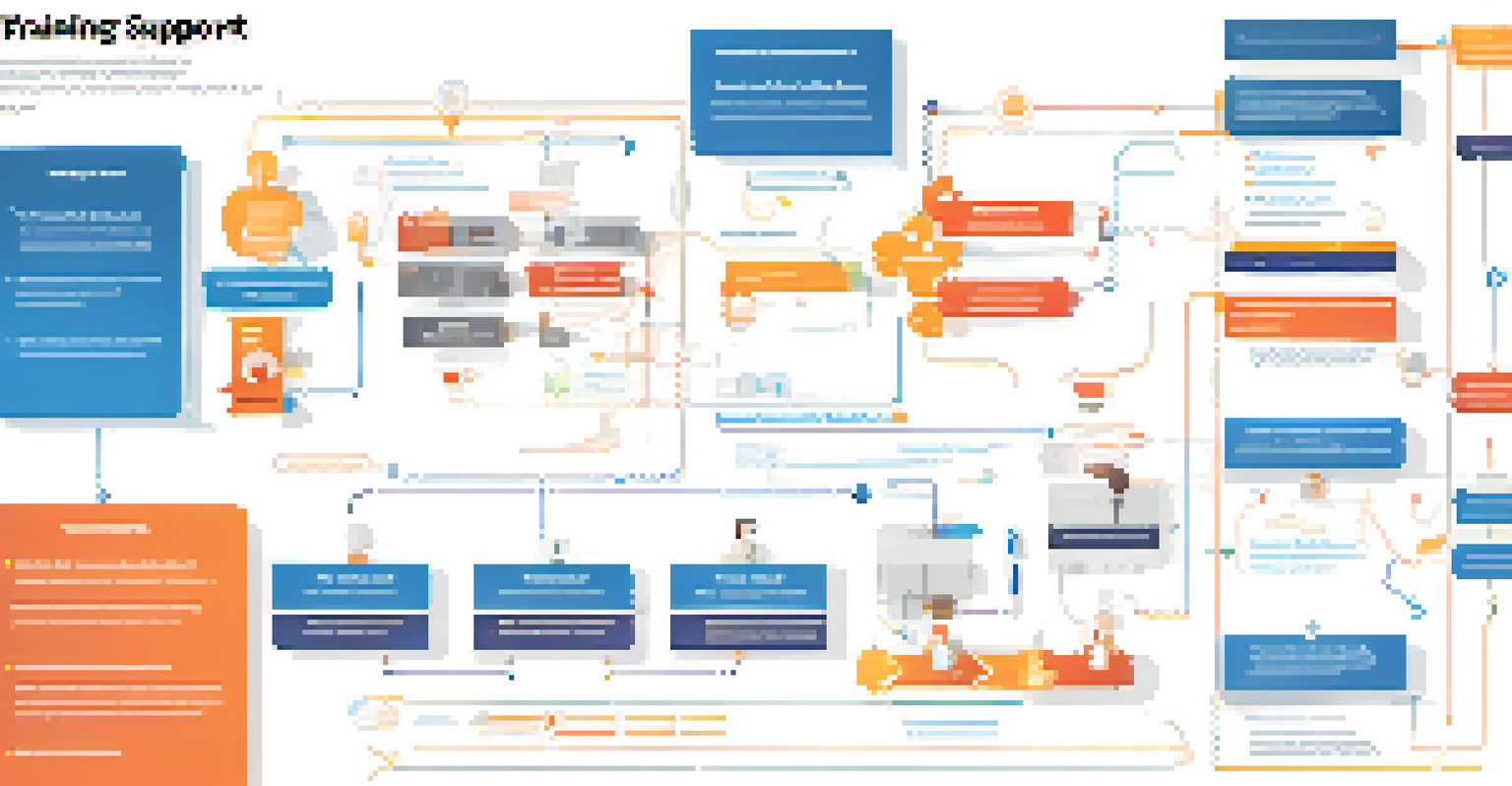The Importance of Training AI for Customer Support Tasks

Understanding AI in Customer Support: A Game Changer
Artificial Intelligence (AI) has transformed customer support, making it faster and more efficient. With the ability to analyze vast amounts of data, AI can help businesses understand customer needs better than ever before. Imagine having a virtual assistant that learns from every interaction, improving its responses over time—this is the power of AI in customer support.
The goal is to turn data into information, and information into insight.
Incorporating AI into customer support doesn’t just streamline processes; it also enhances customer satisfaction. Customers today expect quick answers, and AI can provide immediate responses to common queries. By using AI, businesses can ensure that no customer feels neglected, even during peak times.
However, for AI to function optimally, it requires proper training. This training involves feeding the AI system with relevant data and examples, allowing it to learn and adapt to various customer scenarios. Without this training, AI may struggle to understand context, leading to frustrating customer experiences.
The Role of Data in Training AI for Support Tasks
Data is the lifeblood of AI training. It informs the AI about customer preferences, common issues, and effective solutions. Think of it like teaching a child: the more experiences you share with them, the better they understand the world.

For customer support AI, the data used can include past customer interactions, feedback, and resolution rates. This information helps the AI recognize patterns and improve its responses. For instance, if multiple customers ask about a specific product issue, the AI can learn to prioritize that query in the future.
AI Enhances Customer Support Efficiency
AI streamlines customer support by providing immediate responses and learning from interactions to better meet customer needs.
Moreover, continuous data collection is vital. As customer behaviors and expectations evolve, so should the training data for AI. Regular updates ensure that the AI remains relevant and effective, ready to tackle new challenges as they arise.
Benefits of Well-Trained AI for Businesses
A well-trained AI system can significantly reduce response times and operational costs for businesses. By managing routine inquiries, AI frees up human agents to handle more complex issues, leading to better resource allocation. It’s like having a strong team member who can tackle the basics while others focus on more significant challenges.
Artificial Intelligence is a tool for people to use, not a replacement for people.
Additionally, AI can provide valuable insights into customer behavior and preferences. This data can help businesses refine their services and tailor their marketing strategies, ultimately leading to increased sales. When AI understands what customers want, it can suggest products or services that align perfectly with their needs.
Finally, a well-functioning AI system enhances brand reputation. Customers appreciate quick and effective support, and a business that delivers this consistently earns their trust. Over time, this trust translates into customer loyalty, which is invaluable in today’s competitive landscape.
Challenges in Training AI for Customer Support
While training AI is crucial, it comes with its set of challenges. One of the most significant obstacles is ensuring the quality of data. If the AI is trained on poor or biased data, it can lead to misunderstandings and inappropriate responses. This is similar to teaching a student with incorrect information—confusion is bound to arise.
Another challenge is the need for ongoing training. Customer preferences and market trends can change rapidly, requiring AI to adapt accordingly. Businesses must commit to regular updates of the training data to keep the AI relevant and effective.
Quality Data is Key for AI Training
The effectiveness of AI in customer support relies heavily on high-quality, relevant data to train and adapt its responses.
Moreover, there’s the human element to consider. Customers often seek empathy and understanding, which can be difficult for AI to replicate. Balancing automation with genuine human connection is essential for ensuring customer satisfaction while leveraging AI.
The Importance of Continuous Learning for AI
Continuous learning is a critical aspect of training AI for customer support. As new issues arise and customer expectations shift, AI must evolve to keep up. Think of it as a plant that requires regular watering and sunlight to thrive; without ongoing attention, it may wither.
By implementing feedback loops, businesses can ensure their AI learns from every interaction. This means when customers provide feedback—positive or negative—the AI can adjust its responses accordingly. Over time, this leads to a more refined and effective support system.
Additionally, leveraging machine learning algorithms allows AI to identify trends and adapt even without explicit instructions. This proactive approach ensures that AI remains a valuable asset in meeting ever-changing customer needs.
Integrating AI with Human Support Teams Effectively
Successfully integrating AI into customer support requires careful planning and collaboration with human teams. The goal should be to create a seamless experience for customers, where AI handles routine inquiries while humans tackle more complex issues. It’s like having a well-rehearsed duet where each performer knows their role and timing.
Training human agents to work alongside AI is equally important. They need to understand how the AI operates and how to intervene when necessary. This cooperation can lead to enhanced customer experiences, where technology and human touch complement each other.
Integrating AI with Human Agents
Successful AI implementation requires collaboration with human support teams to create a seamless experience for customers.
Moreover, fostering open communication between AI developers and support teams can yield valuable insights. Human agents can share the nuances of customer interactions, helping to refine AI training and ultimately improve the support system.
Future Trends in AI for Customer Support
As technology continues to advance, the future of AI in customer support looks promising. We can expect more sophisticated AI systems that not only respond to queries but also anticipate customer needs. Imagine an AI that can predict when a customer might need assistance based on their browsing behavior; this level of insight could revolutionize support.
Additionally, advancements in natural language processing (NLP) will enhance the ability of AI to understand and respond to human emotions. This means AI will become more adept at recognizing frustrated customers and providing empathetic responses, bridging the gap between automation and human interaction.

Moreover, integrating AI with other emerging technologies, such as augmented reality (AR), could create immersive support experiences. Customers might receive real-time, visual assistance through their devices, transforming how businesses engage with their audience.